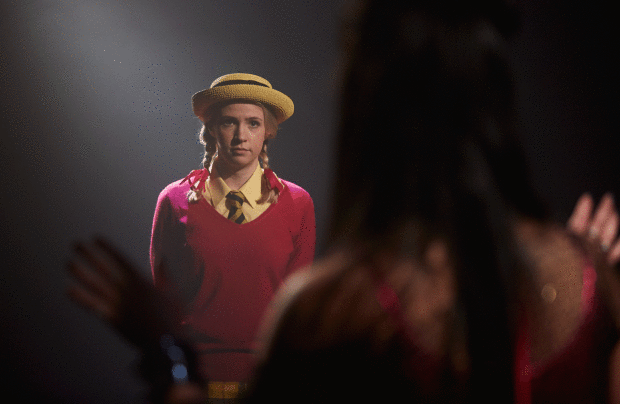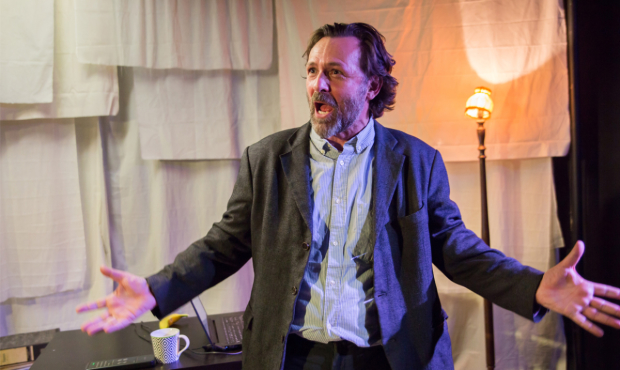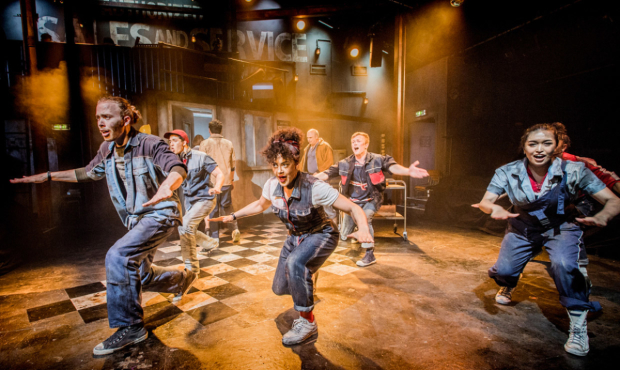Review: A Girl in School Uniform (Walks Into a Bar) (New Diorama Theatre)

(© © Graham Michael)
Lulu Raczka’s slippery third play is no joke. It is, instead, an excoriating look at the way our world objectifies women, and so treats them as punchlines – in more ways than one. But A Girl in School Uniform (Walks Into A Bar) does more than diagnose the issue. By refusing to reduce women to type, it offers both resistance and remedy at once.
On a black strip of stage, two women face one another: a girl in school uniform – garishly pink and yellow – and a barmaid in black. They are, in many ways, each other’s opposite. Steph, the schoolgirl in a tartan skirt and straw boater, is the picture of privileged youth and naivety. Bell, the barmaid, with electric pink hair extensions and silver studs on her boots, comes from the other side of the track. She’s gruff, knowing and hardened by, it seems, a hard life. We make assumptions about them based on appearances. We can’t not.
Raczka drops us (and them) into an apparently dystopian future in which power failures and black-outs have become routine. Darkness is especially dangerous for women – just as it is, still, in our present day. Many go missing or fall foul of men. Indeed, Steph’s come looking for a missing schoolfriend Charlie, who was last seen, similarly dressed, in Bell’s grungy bar. The two of them are forced to endure a black-out together.
At one level, this is a coming of age tale. The longer she spends in Bell’s bar – an exclusively adult space – the nearer she gets to the truth about Charlie, the more the scales seem to fall from Steph’s eyes. Laura Woodward lets us feel her privilege and childishness chipping away by this unexpected encounter.
If it starts testy – Bryony Davies' blunt Bell initially dismisses her with a scoff – the dark changes their relationship to one of care. Rather than counting the seconds, as per official advice, they seek security in storytelling – finding freedom through escapism. Raczka gives us an image of sisterly solidarity – two very different women riffing off one another – but also suggests that in telling stories about men, they disarm their threat. By describing men in detail, Bell reverses the process of reducing people to type.
Raczka’s a writer with a real feeling for theatre and A Girl in School Uniform… builds on that. Her dialogue constantly drags us back into the room and, by collapsing a fictional black-out into a real one, she lets her dystopian future fade back into the theatre. Instead of a schoolgirl and a barmaid in danger, we hear two female voices telling stories here and now. We listen to them in a different way.
Is this all a bit clever for its own good? Probably. Raczka tries to do too much at once – the whole thing works as a narrative critique too – and where she aims for a tantalising ambiguity, the play veers into something wilfully oblique and over-tricksy. The darkness can let us off the hook and while Ali Pidsley’s staging has a jangling atmosphere, it lets the play get away with its lack of clarity.
A Girl in School Uniform (Walks Into A Bar) runs at the New Diorama until 17 February.













